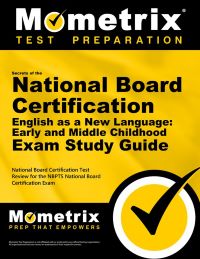National Board Certification English as a New Language: Early and Middle Childhood Exam
The National Board Certification for English as a New Language (ENL) is a prestigious certification that recognizes accomplished teachers who demonstrate advanced teaching practices and a deep commitment to student learning. Specifically designed for educators teaching students from early adolescence through young adulthood, this certification validates a teacher's expertise in supporting English language learners (ELLs) in their journey to achieve language proficiency and academic success. The certification process is rigorous and requires teachers to showcase their skills, content knowledge, and the ability to foster a supportive and effective learning environment for ELLs.
Eligibility
To be eligible for the National Board Certification in English as a New Language, candidates must meet several requirements. Firstly, candidates must hold a bachelor's degree from an accredited institution. Additionally, they must have completed a minimum of three years of successful teaching experience at the time of their application. This experience should involve working directly with students in the specified age range of early adolescence through young adulthood. Furthermore, candidates must possess a valid state teaching license, ensuring they are legally qualified to teach in their respective states. These eligibility criteria ensure that candidates have the foundational knowledge and experience necessary to pursue this advanced certification.
Syllabus
The syllabus for the National Board Certification in English as a New Language is comprehensive and designed to assess a teacher's proficiency across several key areas. It is structured around the core propositions of the National Board for Professional Teaching Standards, which emphasize a commitment to students and their learning, knowledge of the subject matter, effective management and monitoring of student learning, systematic reflection on practice, and participation in learning communities.
The key components of the syllabus include:
- Content Knowledge: Candidates must demonstrate a deep understanding of the English language, including its grammar, syntax, and phonetics. They should also be well-versed in the cultural and linguistic backgrounds of their students to tailor instruction effectively.
- Instructional Practice: This component evaluates a teacher's ability to design and implement effective instructional strategies that cater to the diverse needs of ELLs. It includes lesson planning, classroom management, and the use of technology to enhance learning.
- Assessment: Candidates must show proficiency in designing and utilizing assessments to measure student progress and inform instruction. This includes both formative and summative assessments tailored to the needs of ELLs.
- Professional Development: Teachers are expected to engage in continuous professional growth by reflecting on their teaching practices, seeking feedback, and participating in professional learning communities.
- Collaboration and Advocacy: This area focuses on a teacher's ability to collaborate with colleagues, families, and communities to support ELLs. It also emphasizes the importance of advocating for the needs of ELLs within the educational system.
Format of the Exam
The National Board Certification process for English as a New Language is divided into four components, each designed to evaluate different aspects of a teacher's professional practice. The components are as follows:
- Component 1: Content Knowledge
This computer-based assessment tests a candidate's knowledge of the English language and their understanding of language acquisition theories and practices. It includes multiple-choice questions and constructed response items that require candidates to demonstrate their expertise in teaching ELLs.
- Component 2: Differentiation in Instruction
In this component, candidates submit a portfolio that includes evidence of their ability to differentiate instruction to meet the diverse needs of ELLs. This includes lesson plans, student work samples, and a written commentary explaining the instructional decisions made to support student learning.
- Component 3: Teaching Practice and Learning Environment
This component involves video recordings of the candidate's teaching practice. Candidates must submit videos that showcase their ability to create an effective learning environment and engage ELLs in meaningful learning experiences. A written analysis accompanies the videos, providing context and reflection on the teaching practices demonstrated.
- Component 4: Effective and Reflective Practitioner
Component 4 requires candidates to demonstrate their ability to use assessment data to inform instruction and improve student learning. This component includes evidence of collaboration with colleagues and families, as well as a reflective commentary on the candidate's professional growth and impact on student learning.
Each component is scored individually, and candidates must achieve a minimum score on each to earn certification. The assessment process is designed to be comprehensive and reflective, allowing candidates to showcase their teaching expertise and commitment to the success of English language learners.
Study Guide And Test Preparation For National Board Certification Art: National Board Certification English as a New Language Early and Middle Childhood Exam
A Complete National Board Certification Art: Early Adolescence through Young Adulthood Exam Study Guide that includes sample questions, test tips and a complete study plan prepared by a team of expert and dedicated researchers. Cost-effective and qualified exam help from a committed exam preparation company.

